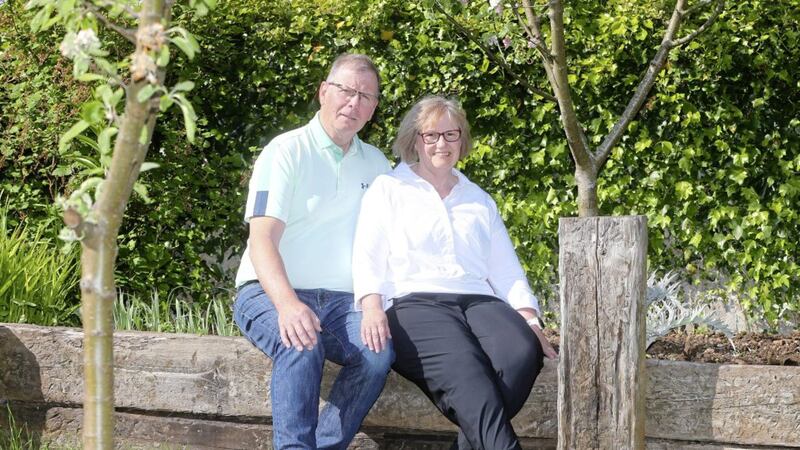RETIRED nurse Una McMillan’s dearest wish is to see her grandchildren grow up, go to university and get married. But the 69-year-old Ballycastle woman and her family are painfully aware that she might not be able to enjoy these and other precious milestones.
Una is one of around 1,200 people in Northern Ireland living with Idiopathic Pulmonary Fibrosis (IPF), a progressive disease that causes scarring of the lungs and for which there is currently no cure, other than a lung transplant.
The condition leads to a decline in lung function and ability to breathe so that simple, everyday activities such as putting on socks or walking upstairs become mammoth challenges. There is no known cause, although it can be genetic.
Una, who has lost other family members to the disease, was diagnosed five years ago after undergoing tests. The grandmother-of two, who was a keen walker and traveller, had no symptoms at that point, and the positive diagnosis was a devastating blow for her, husband Tom and their three adult children.
However, since then the couple have been throwing themselves into fundraising and trying to make a difference to the lives of other IPF sufferers as members of the Northern Trust Pulmonary Fibrosis Support Group.
The group was set up in 2015 by respiratory staff from Antrim Area Hospital and has been chaired by Tom since 2016. Members not only support each other but lobby for better awareness and access to treatments.
One of the biggest issues facing families is the provision of anti-fibrotic drugs. At present, there are two drugs available in Northern Ireland and, although they don’t stop the disease, they can slow it down and prolong life for up to three or four years.
However, under current NICE (National Institute for Health and Care Excellence) guidelines the drugs can only be prescribed when a patient’s lung capacity has dropped to 80 per cent or below.
“At that stage, you are almost on your knees for breath. You can’t go upstairs without stopping three or four times,” says Tom. “IPF must be one of the only conditions where you are going to the hospital in the hope you are worse so they will give you the drugs to prolong your life.”
Tom (68), who spent his career in the fire service and is his wife’s carer, also says the UK is unique in Europe in not prescribing anti-fibrotic drugs on diagnosis. He explains: “If Una was living in another European country, she would be tested early because of her family history. In France, they offer the test to every single family member and if it’s detected they are offered the drugs.
“Here, generally what happens is that people become breathless and they wonder why. About 65 per cent of people are misdiagnosed for between three and five years. It’s just treated as a chest infection or a bad cough.
“A lot of people in the UK buy the drugs direct from India. They cost between £5,000 and£6,000 a year, the equivalent of the state pension. So these people are having to use their savings, pension or family support for their treatment.
“Una worked for 30 years as a nurse for the NHS while raising three kids, she paid her taxes all that time and yet if she reaches the point where she wants a drug to help prolong her life she will have to buy it. And there are a lot of other people in the same position.”
Tom points out that NICE is due to decide this month on whether to prescribe anti-fibrotic drugs to every sufferer and that, even if it is agreed, there will still be a 52-week lead-in during which time more people will die.
Around 300 people in Northern Ireland are diagnosed every year with IPF and more than 200 die from it. The condition affects mainly those in the 50-70 age bracket and average life expectancy after diagnosis is between three and five years.
The early symptoms may include shortness of breath, a dry cough and fatigue, and sufferers will eventually need 24-hour oxygen to help support their breathing and other vital organs.
Although the condition is generally not known among the general population it is more common than many cancers, including leukaemia and ovarian cancer.
One of the biggest frustrations for Tom and members of the group is the discrepancy between provision for patients here and in other parts of the UK. In 2016, a report by the British Lung Foundation revealed that Northern Ireland had the highest prevalence of IPF in the UK, “yet no action appears to have been taken to try to find out why that was the case,” adds Tom.
“The development of these drugs can take 10 to 15 years so it’s a big investment for a drug company to get involved in. What we need is for our government to step up to the mark and say ‘we are going to help these people’.
“We also have a problem in Northern Ireland in relation to trials. There are drug trials going on all the time in the rest of the UK but people here never get the option to take part in them.
“A chronic cough and reflux are the two big problems associated with IPF and the drug trials could be alleviating those symptoms for people. It is very frustrating not to be given that opportunity as we do a lot of work here.”
In fact, the support group won an award last year from its parent charity, Action for Pulmonary Fibrosis, for being the best fundraising group in the UK, having raised over £23,000 for research in the past two years.
Another problem facing sufferers is navigating the benefits system. Even though IPF is considered a terminal illness, many people are refused Personal Independence Payments, while carers can also have difficulty claiming an allowance.
Says Tom: “I deal with it almost daily. It’s absolutely ridiculous and inhumane. The last thing you want when you are very ill is to be worrying about money.”
He said the issue of IPF, and sufferers accessing benefits, was raised at a recent meeting of the Northern Ireland All Party Working Group on lung health. Its chairperson, MLA Pam Cameron, has written to the Department of Communities and the issue is currently under discussion.
Among the other issues the group is lobbying on is access to a specialist respiratory centre, similar to those in other parts of the UK, and a new lung health strategy so that people can receive the right treatment at the right time.
Tom and Una, meanwhile, continue to make the most of life, even though it has changed for them.
“Una is very fortunate that she doesn’t need oxygen at the moment,” says Tom. “She does a little bit of yoga and other exercise and works on the philosophy that her lungs are muscles and she tries to keep the capacity as strong as she can.”
Una also has an electric bike which enables her to get out in the fresh air, something she and Tom have always enjoyed doing as a couple.
:: The support group, which runs a separate carers’ group, has just launched its website with the help of a student at South West College, Enniskillen. Anyone wishing to contact them for support or advice should log on to northerntrustpfsg.com




